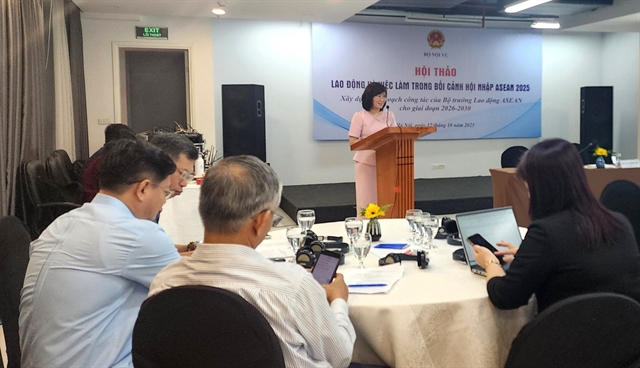 Society
Society


|
| The workshop on labour and employment in the context of ASEAN integration is held in Hà Nội on Friday. — VNA/VNS Photo Chu Thanh Vân |
HÀ NỘI — Việt Nam has been an active contributor to the regional labour and employment, experts heard at a workshop on the matter in the current context of ASEAN integration on Friday morning.
The event aims to update the progress of activities during the 2021-25 period, review the development of the ASEAN labour work plan for 2026-30, and discuss priorities and proposed activities for Việt Nam as the pioneer in ASEAN labour cooperation during the next five years. This is part of preparations for the ASEAN Senior Labour Officials Meeting (SLOM).
In her opening remarks, Dr Hà Thị Minh Đức, deputy director general of the Department of International Cooperation (under the Ministry of Home Affairs – MoHA), said that the ministry and relevant departments are actively involved in developing a new work plan to carry out ASEAN’s master plan and strategic plan toward 2035.
During the process of developing strategic plans for all three politic, economic and socio-cultural pillars of the ASEAN Community, there has been close consultation with relevant ministries and sectors through specialised channels.
The MoHA, as the coordinating agency for the ASEAN Socio-Cultural Community (ASCC), has consolidated the priorities and aspirations of various ministries and sectors into the regional plan.
During the workshop, delegates reviewed the ASEAN Labour Ministers’ Work Programme (ALM-WP) for 2021-25, which outlines strategic goals and activities to build a cohesive and prosperous ASEAN Community.
The programme’s objective is to improve the quality of life for ASEAN citizens by developing a highly competitive workforce engaged in safe and decent work, said Phan Nhật Minh, a specialist for labour cooperation through the ASEAN Labour Ministers’ channel. The aim is to create a cohesive ASCC that is inclusive, sustainable, resilient and dynamic.
Between 2021 and 2025, Việt Nam has played a leading role in significant activities, including acting as the coordinator for several strategic areas.
Việt Nam has led the implementation and monitoring of ASEAN guidelines on gender mainstreaming in labour and employment policies to promote decent work for all.
Another notable initiative led by Việt Nam is the comparative study of laws and policies on managing migrant labour in ASEAN (2020), focusing on professions covered under the eight ASEAN Mutual Recognition Arrangements (MRAs).
Additionally, Việt Nam spearheaded a 2022 study on female migrant workers in ASEAN member states, examining migration channels, regional and international standards on labour migration and gender equality, and the impact of the COVID-19 pandemic. The study also provided best practices and recommendations tailored to each country.
Việt Nam has also partnered with other ASEAN countries on projects such as the Labour Market Information System (LMIS), co-led with Indonesia and the Philippines. This project aims to help ASEAN countries develop evidence-based employment and skills policies.
The three countries also works with the Republic of Korea’s Research Institute for Professional Education and Training (KRIVET) to enhance the competitiveness of ASEAN’s human resources through responsive vocational training programmes.
Addressing the workshop via video call, Carl Rookie O. Daquio, a senior official from the ASEAN’s Labour and Civil Service Division, presented updates on the development of the ALM-WP for 2026-30, with activities proposed by ASEAN member states across various specialised sectors.
Representatives from the Vietnamese MoHA’s international cooperation department summarised Việt nam’s priorities, including digital transformation, green transition, and international integration plans to align with regional programmes.
They also discussed Việt Nam’s key activities for 2026-30 related to the ALM-WP and proposed Việt Nam-led initiatives. — VNS




